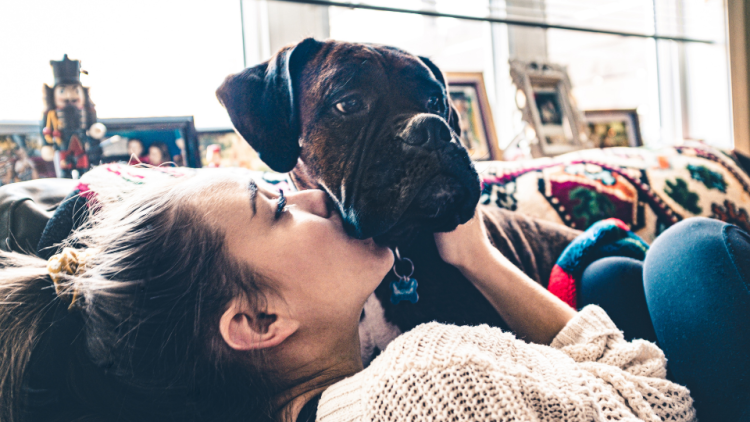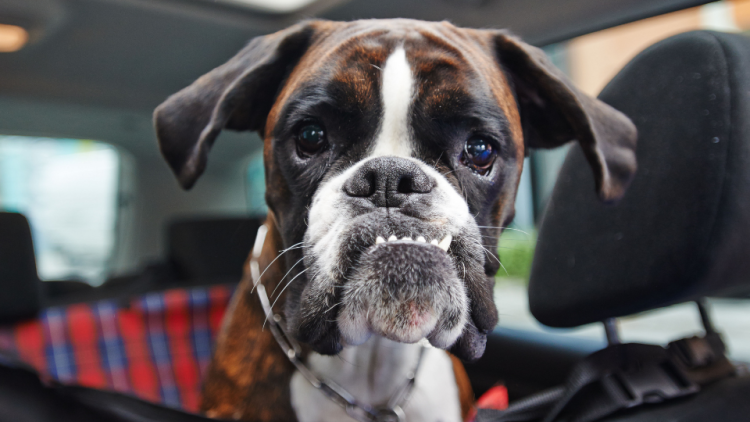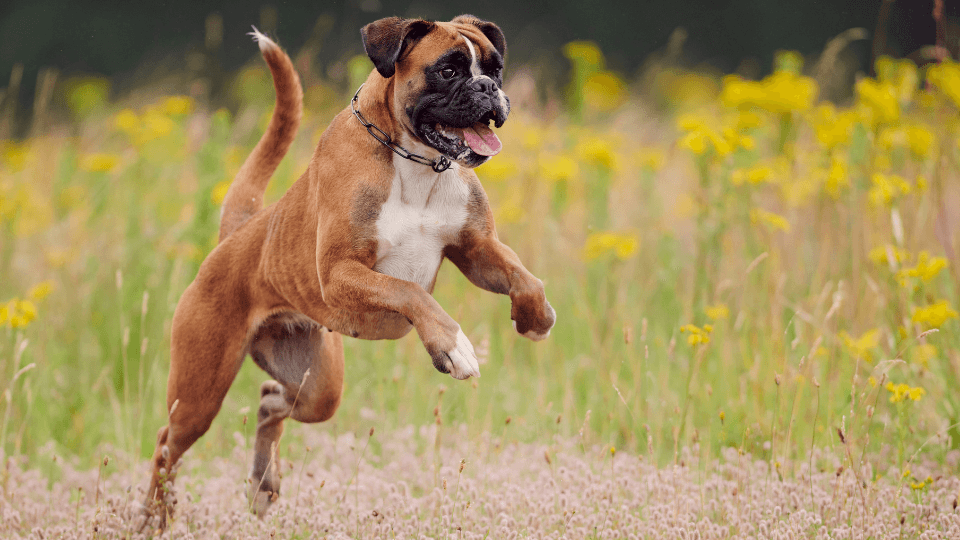Boxers are known for their loyalty, charisma, and intelligence. One of the first breeds to be recognized by the American Kennel Club, Boxers are among the most popular breeds today, ranking at number ten on AKC’s list.
While they can seem a little intimidating at first, Boxers are actually very sweet and playful. Their protective instincts also make them perfect for families with kids.
Not sure whether a Boxer is the right dog for you? Keep reading to find out more about this breed, including history, personality traits, care requirements, and more.
Pro Tip: Dog owners can be reimbursed for up to 90% of eligible veterinary bills by enrolling in pet insurance. Compare Boxer health insurance plans to have peace of mind knowing that your beloved pet will have access to great vet care for life.
Boxer Characteristics
Physical appearance
Boxers are stocky and muscular dogs. Female Boxers weigh between 50 and 65 pounds and can be from 21 to 25 inches tall, whereas males weigh between 65 and 80 pounds and grow to about 25 inches tall.
Boxer dogs have distinctly shaped square heads with undershot jaws and blunt muzzles. They have a broad and deep chest, a relatively short and strong back, and tails that curl slightly at the end. Their ears fold over but are often cropped to stand erect and they have compact feet and arched toes.
Boxers are moderate shedders, with a short coat that comes in three color varieties: fawn, brindle, and white. Their mask is usually black, but many members of the breed have white face markings, as well as white markings on the paws and chest.
Personality and behavior
Boxers are energetic and intelligent dogs that like to keep busy. They are very loyal and prepared to guard their home and owners should the need arise.
They usually get along well with other dogs and cats if socialized from a young age but they also have a reputation for aggression toward unknown animals so, like all dogs, they should not be allowed to run loose or unattended.
Boxers aren’t known to be big barkers and if they do bark, there is usually a good reason. They are, however, quite vocal and tend to make growling noises that are just their way of talking. While growls normally serve as a dog’s warning sign that they are scared or upset, that may not always be the case with this breed.
Lifespan
The average lifespan of Boxers is between 10 and 12 years. However, quite a few owners lose their pets much earlier, most commonly from cancer. According to a study by the University of Georgia, out of 70k dogs of more than 80 breeds, cancer is the leading cause of death for Boxers, accounting for nearly 45% of deaths.
On the other hand, some Boxer dogs reportedly reach up to 15 years. There are even documented cases of members of the breed living as old as 16.

Boxer History
Boxers are related to almost all bulldog-type breeds. The Boxer originated in Europe in the 16th century but the breed was perfected in Germany during the late 19th century and early 20th century.
Boxers were originally used for dog-fighting but were later developed into hard-working and loyal dogs that were used as hunters, protectors, cattle dogs, war dogs, guide dogs for the blind, and police dogs.
The breed was recognized by the American Kennel Club in 1904 but started to gain popularity in the US during the 1930s. Today, the breed ranks 10th on AKC’s list of most popular dog breeds.
Boxer Care
Training
Early socialization and puppy classes are recommended in order to properly channel the breed’s energy. Boxers are very intelligent but can easily become bored with repetitive routines which may result in dangerous or destructive behaviors at home. They are also good at problem-solving but can sometimes be quite stubborn. Boxers enjoy participating in a number of canine activities including agility, herding, and obedience. They are also great as therapy, assistance, service, and police dogs.
Exercise
As mentioned before, Boxers are very energetic and playful, so they require lots of daily exercise (be sure that your dog is always on a leash or in a securely fenced area). Being originally bred as wild game chasers, Boxers also like to jump and leap, especially when they’re small puppies. Their intelligent and curious nature also make them great candidates for mental exercise with puzzle toys, snuffle mats, and other games that require them to use their brains.
Grooming
Boxers have a short coat that requires little grooming - a short brushing once or twice a week should be enough. They’re also clean dogs and only need baths occasionally. Their nails need to be trimmed about once a month and their teeth should be brushed frequently in order to prevent tartar buildup.
Nutrition
Boxers should be fed two or three cups of good-quality dog food twice a day, though their exact intake will be based on their activity level and size as determined by your boxer’s veterinarian. As a deep-chested breed, Boxers are anatomically predisposed to gastric dilatation-volvulus (GDV or canine bloat), so you might want to provide an elevated food bowl so that your pup doesn't have to bend down to the floor to eat as this can minimize the amount of air being ingested with their food. Feeding two meals can help prevent your Boxer from eating too fast or too much, which can cause bloat. Additionally, try to limit playtime or exercise for 30 minutes before and after meals to reduce the risk of GDV.
Living environment
Boxers enjoy the company of their owners and don’t like being left outside alone. In addition, exposure to outside temperatures for longer periods of time isn’t healthy for them. Due to the relatively thin coat, the breed has poor tolerance to heat and cold.
In hot weather, Boxers kept outside are vulnerable to breathing issues, dehydration, and heatstroke. When it's very hot outside (over approximately 85 degrees Fahrenheit) limit your boxers time outside to the early mornings and evenings if possible and avoid strenuous outdoor exercise. In cold weather, when the temperature falls below freezing, be sure to provide a warm coat or fleece and booties for your dog to keep them warm while exercising outdoors.

Boxer common health issues
Like all dog breeds, Boxers are prone to certain health issues, including genetic diseases like arrhythmogenic right ventricular cardiomyopathy, a congenital heart disease that’s usually fatal.
Other genetic medical conditions that commonly affect the breed include:
- Degenerative myelopathy, a progressive disease of the spinal cord in senior dogs
- Aortic stenosis
- Hip dysplasia
- Elbow dysplasia
Responsible breeders will screen their breeding dogs for genetic abnormalities and try to breed only animals who are healthy and less likely to carry these heritable diseases. Always ask to see veterinary screening certificates for a puppy’s parents and grandparents before you buy a Boxer from a breeder.
Other health conditions affecting Boxer dogs include:
- Cancers, including lymphoma, hemangiosarcoma, and mast cell tumors
- GDV, which sometimes results in stomach torsion
- Hypothyroidism
- Skin allergies
Boxers belong to the brachycephalic breed class, which means that their flat face and wrinkled snout can cause breathing difficulties, especially during hot weather.
Pro Tip: Boxers do have their share of health problems, which is why it’s a good idea to sign your Boxer up for pet insurance while they are still a puppy.
Where to adopt or buy a Boxer
If you’re thinking about welcoming a Boxer into your family, start by contacting the American Boxer Club for reputable breeder referrals and listings of Boxer rescues throughout the States.
Be sure to conduct thorough research before you get a Boxer to make sure the breed is right for you.
If you’re interested in similar breeds, consider looking into Cane Corso, Boston Terrier, and Bullmastiff. You should also consider the many different Boxer mixes, including:
- The Boxer Pitbull Mix (Bullboxer)
- The Boxer Labrador Mix (Boxador)
- The Great Dane Boxer Mix (Boxane)
- The Boxer Beagle Mix (Bogle)
- The Mastiff Boxer Mix (Boxmas)
Key Takeaways
- Boxers are big and muscular dogs who look quite imposing but are actually very loyal, affectionate, and intelligent.
- With minimal grooming needs and well-known gentleness with kids, the Boxer makes a perfect companion and an excellent family pet, as long as you provide them with plenty of exercise and mental stimulation.
- Being originally bred for dog-fighting, Boxers are very strong and courageous and are widely used as service dogs in the police and military, as well as search-and-rescue work.
- Like all breeds, Boxers are prone to certain health issues like cancer, bloat, hip dysplasia, etc.
- Finding a boxer puppy or adult dog can be easy, but be careful of puppy mills and internet scams.
